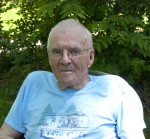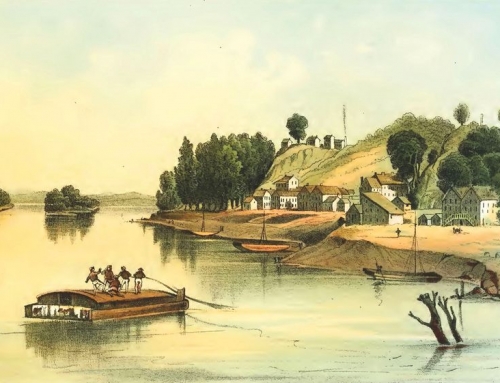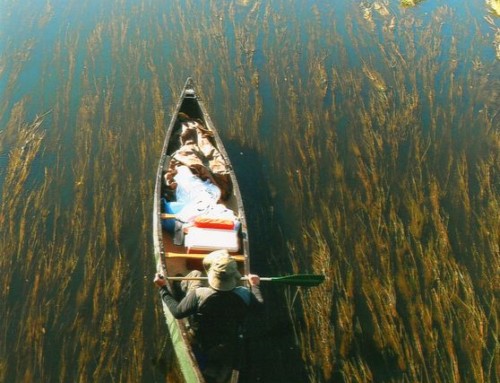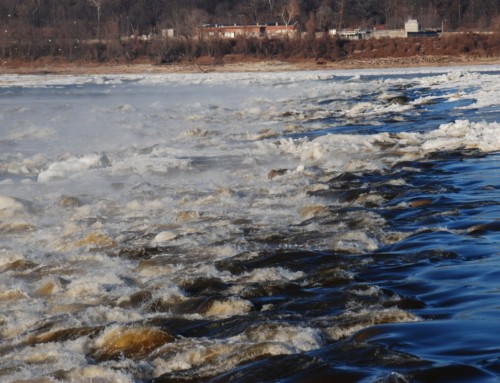In 2011, I got to spend most of the summer getting to know northern Minnesota. I spent a month of that time based in Grand Rapids, thanks to a generous offer from a friend who set me up in her house. She also gave me the names of several people to contact to ease my transition into life as a temporary Grand Rapidian. One of those people was Bill Marshall.
Bill was Land Commissioner for Itasca County for about 20 years and seemed to know just about everything about the forest and everyone in town. He introduced me to a lot of people and regularly invited me to events, including his morning coffee rounds. He was as warm and welcoming a person as I have ever met, and it was all genuine.
Bill passed away in April at the age of 91. I was lucky enough to enjoy several conversations with him, including a lengthy interview in 2011 through which I learned quite a bit about his life, the forest, and northern Minnesota. After those conversations, I wrote a profile of Bill for a book project that hasn’t yet seen the light of day, so I’m posting a copy now to share a few things about the man I got to know and admire.
The Dean of the Forest
I met Bill Marshall at the Arby’s on Pokegama Avenue in Grand Rapids. He invited me to join his coffee clutch—a small group of retired men that included a former newspaper editor, the president of the local college, a law enforcement veteran, and a bunch of guys who worked together at the phone company who all preferred cheap coffee (a quarter a cup) over good coffee. A few days later I was joining Bill and his family for their weekly Saturday morning coffee at Bixby’s. Bill was as genuinely welcoming a person as I have ever met.
He was born and raised in a northeast Minneapolis neighborhood where the streets were filled with golf ball-sized chunks of limestone, which just happened to be the perfect size and weight for a kid to throw at street lights. He and his friends would sometimes compete to see how many chunks it would take for them to knock out a light altogether.
His father was an engineer with Northern States Power Company, a native of Duluth and a Navy veteran of World War I. His mother grew up in rural Iowa but her family later moved to Minneapolis. When Bill was a child, the family would vacation at a cabin on Pokegama Lake that had been built by Bill’s aunt in 1935. It was a rustic place, with no plumbing and lit only by kerosene lamps.
“To a kid it was ideal,” Bill told me. “We had this whole world to ourselves. Across the lake there wasn’t one habitation of any kind, it was all wild; you could hear coyotes howling. My brother and I wore a pair of pants and ran around all summer bare feet, bare-chested.”
Bill served in the Navy Air Corps near the end of World War II where he learned to fly. The Navy, though, decided they had enough pilots already, so he was reassigned to air gunnery. Lucky for him, the war ended before he saw combat. After the war, he used the GI Bill to get a degree in forestry, determined to get back to those woods of his childhood.
After he graduated, he went to the St. Paul office of the Minnesota Department of Natural Resources (DNR) and met with the director. He asked if the DNR had any open positions.
“I remember him sitting back in his chair, feet on the desk and smoking a cigarette.
‘You want a job?’ he asked.
‘Yes,’ I said. ‘I just graduated from Forestry school, and I’d like a job.’
‘We got two of ‘em, one open at Big Falls and one at Effie. You want one of those?’
‘Yea, I’d like the one at Effie.’
‘Be up there a week from Monday; we’ll send the papers up. You can sign ‘em up there.’
It was that easy. And it was a good job.”
Bill was hired as a forester and one of his first tasks was to figure out how to make use of a brand new technology called aerial photography. That technology enabled foresters to map remote tracts and catalog its trees far more accurately than had been possible before.
After six years as a state forester, though, he heard some news that bothered him. “The word was out that guys that had gone to school for forestry, they hoped to get them to the main office in St. Paul because a lot of guys were going to be retiring. Well that
The Itasca County Land Department had an opening at that time, so he left the state DNR for a job helping to manage the county’s 400,000 acres of public land. There were just three people in the department to keep an eye all that land. “We were planting trees all over the place and putting in public accesses. My boss was an old lumberjack; he’d grown up around Reads Landing down at Lake Pepin…He was one tough old dude. When he retired I got his job.” Bill worked as the county’s Land Commissioner from 1961 to 1982.
One of the programs he managed was a summer tree planting project that employed a lot of area youth; each year they planted over a million trees! Many of the youth were Ojibwe Indians, and, over time, he got to know them and their extended families. He was eventually given an Ojibwe name that meant Great Thunderbird (which I think would be chi-binesi in Ojibwemowin) and was included in some family rituals.
During our chats, I asked Bill about some of the creatures that can make life in the northern forests uncomfortable, which led to a story about leeches. He was exploring the site of an old logging camp and decided to swim out into a lake to look for relics. “Well, I swam out into this thing…and when I came back to shore, I bet I had 500 little dang leeches on me. They were so small they were transparent, but they all grabbed ahold and starting sucking, so they all had a little red spot where the blood was coming in. Well, I scrape off these things and it looks like I’m bleeding to death,” he said, laughing.
He retired at age 58. Like everyone else, Bill had his moments where office politics had clashed with common sense, which caused the typical frustrations. He had a pretty good attitude about it, though.
“Life is full of that kind of stuff. You don’t want to take that too seriously or you won’t sleep at night. You do what you can and forget the rest.”
Bill never stopped enjoying time in that old cabin on Pokegama Lake, which has electricity now but is otherwise just as rustic as the cabin of his youth. He also didn’t seem to have much trouble transitioning from full-time work to retirement.
“That’s the nice thing about getting older, you have time to sit and watch that stuff [like a spider in his garage or the clouds passing over head]. When you’re young, you don’t think of it, you don’t have time to look at it. It’s fun to sit in the yard and just look at all the different things and listen to the different birds singing. Some poor guy’s caught up in everyday life and you ask that guy, Did you hear that bird? What bird? Do you know what kind it is? No, no idea. It’s kinda too bad to be so oblivious to your surroundings.”
Growing older also made him more sensitive to the plight of a variety of creatures, of their right to exist. “You tend to become sympathetic to all forms of life. Geez, I’m getting so bad, I get a beetle in the house I make sure to get him outside and give him his freedom. I don’t want to flush him down the toilet. It seems kinda inhumane.”
Bill had the forest in his blood and probably understood it better than most people do. He also had a gift for describing the moments that made the forest so special to him. As you may know, winter in Minnesota can be harsh and unforgiving, but Bill could find joy on the coldest of winter days. He told me a story about one day in particular, although I suspect this was something of a regular event for him.
“I stopped in the forest for lunch. I got a fire started and scooped some snow into a tin cup and let it melt over the fire. I’d pick a few leaves of Labrador tea and add them to the water. I’d pull a sandwich out of my backpack and put it over the fire to thaw it out (it had frozen on the hike in). I might have a chickadee for company—they might fly over and sit on my shoulder—but otherwise I’d just sit there and listen to the quiet.”
Of the many admirable qualities Bill possessed, perhaps the one that was most remarkable, one that seems increasingly in short supply, is that Bill knew that he was part of a bigger world, part of the natural world, but not its master. I doubt if there’s any other way for a person to appreciate the stillness of a winter day or the song of a bird ten feet away or the right of a beetle to be.
©Dean Klinkenberg, 2016





Thanks, Bill! I consider myself very lucky to have had the chance to get to know him.
Thanks Dean- that left me quite misty-eyed with a big lump in my throat. I even heard a few stories for the first time. I remember you joining us for coffee, and also remember Grandpa speaking fondly of you and your journey. -Bill Marshall (grandson)